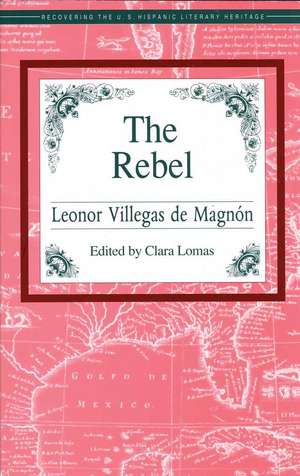The Rebel
Autor Leonor Villegas de Magnon, Leonor Villegas De Magnonen Limba Engleză Paperback – 31 dec 1993
Preț: 78.79 lei
Nou
Puncte Express: 118
Preț estimativ în valută:
15.08€ • 15.78$ • 12.47£
15.08€ • 15.78$ • 12.47£
Carte indisponibilă temporar
Doresc să fiu notificat când acest titlu va fi disponibil:
Se trimite...
Preluare comenzi: 021 569.72.76
Specificații
ISBN-13: 9781558850569
ISBN-10: 1558850562
Pagini: 297
Dimensiuni: 138 x 216 x 27 mm
Greutate: 0.48 kg
Editura: Arte Publico Press
ISBN-10: 1558850562
Pagini: 297
Dimensiuni: 138 x 216 x 27 mm
Greutate: 0.48 kg
Editura: Arte Publico Press
Textul de pe ultima copertă
The Rebel is the memoir of a revolutionary woman, Leonor Villegas de Magnon (1876-1955), who was a fiery critic of dictator Porfirio Diaz and a conspirator and participant in the Mexican Revolution. Villegas de Magnon rebelled against the ideals of her aristocratic class and against the traditional role of women in her society. In 1910 Villegas moved from Mexico to Laredo, Texas, where she continued supporting the revolution as a member of the Junta Revolucionaria (Revolutionary Council) and as a fiery editorialist in Laredo newspapers. In 1913, she founded La Cruz Blanca (The White Cross) to serve as a corps of nurses for the revolutionary forces active from the border region to Mexico City. Many women like Villegas de Magnon from both sides of the border risked their lives and left their families to support the revolution. Years later, however, when their participation had still been unacknowledged and was running the risk of being forgotten, Villegas de Magnon decided to write her personal account of this history. The Rebel covers the period from 1876 through 1920, documenting the heroic actions of the women. Written in the third person with a romantic fervor, the narrative interweaves autobiography with the story of La Cruz Blanca. Until now Villegas de Magnon's written contributions have remained virtually unrecognized - peripheral to both Mexico and the United States, fragmented by a border. Not only does her work attest to the vitality, strength and involvement of women in sociopolitical concerns, but it also stands as one of the very few written documents that consciously challenges stereotyped misconceptions of Mexican Americans held by both Mexicans and Anglo-Americans.
